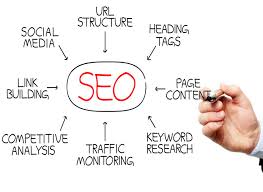Guaranteed SEO Services: Separating Fact from Fiction
Guaranteed SEO Services: Separating Fact from Fiction
In the world of digital marketing, the promise of guaranteed SEO services can be alluring. Businesses are constantly seeking ways to improve their online visibility and attract more traffic to their websites. However, the concept of guaranteed SEO services is often met with skepticism and uncertainty.
It’s important to understand that while reputable SEO agencies can certainly enhance your website’s performance and rankings, the idea of guaranteeing specific results in the ever-evolving landscape of search engine algorithms is not realistic. Search engines like Google frequently update their algorithms, making it impossible to guarantee a specific ranking position or immediate success.
So, what should businesses look for when considering SEO services?
The Value of Ethical SEO Practices
Instead of focusing on guarantees, businesses should seek out SEO agencies that emphasise ethical practices and long-term strategies. White-hat SEO techniques that comply with search engine guidelines are crucial for sustainable growth and organic visibility.
Transparency and Communication
A trustworthy SEO agency will provide transparency regarding their methods and progress. Regular reporting, clear communication, and insights into the strategies being implemented are essential for building trust between the agency and the client.
Customised Strategies
Every business is unique, with distinct goals and target audiences. Effective SEO services involve tailored strategies that align with the specific needs and objectives of each client. A one-size-fits-all approach does not yield optimal results in the competitive digital landscape.
The Role of Continuous Improvement
SEO is an ongoing process that requires monitoring, analysis, and adaptation over time. A reputable SEO agency will continuously assess performance metrics, adjust strategies based on data insights, and stay informed about industry trends to ensure sustained growth in search engine rankings.
Conclusion
While guaranteed SEO services may sound appealing on the surface, it’s essential for businesses to approach such promises with caution. By prioritising ethical practices, transparency, customised strategies, and a commitment to continuous improvement, businesses can partner with an SEO agency that delivers long-term value and sustainable results in the dynamic world of digital marketing.
17 Common Questions About Guaranteed SEO Services and Their Value
- How much is SEO per month?
- What is first page SEO guaranteed?
- Is SEO a waste of money?
- Is it worth paying someone to do SEO?
- Can you guarantee SEO results?
- Is it worth paying for SEO services?
- Is SEO still relevant in 2022?
- How much does it cost to have someone do SEO?
- Is it worth it to pay for SEO?
- How to get 100% SEO?
- Who is the best SEO service provider?
- Can SEO be guaranteed?
- Is paying someone to do SEO worth it?
- Can SEO results be guaranteed?
- Does SEO still work in 2022?
- Is SEO worth it in 2022?
- Can I pay to improve my SEO?
How much is SEO per month?
When considering SEO services, a frequently asked question revolves around the cost: “How much is SEO per month?” The pricing of SEO services can vary significantly depending on various factors such as the scope of work, competitiveness of keywords, and the level of expertise provided by the agency. While some agencies may offer fixed monthly packages, it’s important to remember that quality SEO services tailored to your specific business needs may require a customised pricing structure. Investing in SEO should be viewed as a long-term strategy to enhance online visibility and drive sustainable growth rather than a one-size-fits-all monthly expense. Transparency regarding pricing and the value delivered is key when selecting an SEO provider that aligns with your objectives and budget.
What is first page SEO guaranteed?
When businesses inquire about “first page SEO guaranteed,” they are often seeking assurance that their website will secure a prominent position on the first page of search engine results. While the desire for high visibility is understandable, it’s important to approach such claims with caution. In the realm of SEO, guaranteeing a specific ranking on the first page is not feasible due to the dynamic nature of search engine algorithms and the competitive landscape. Reputable SEO services focus on implementing ethical strategies, continuous improvement, and customised approaches to enhance a website’s visibility over time, aiming for sustainable growth rather than immediate guarantees of first-page rankings.
Is SEO a waste of money?
The question of whether SEO is a waste of money is a common concern among businesses navigating the digital marketing landscape. While it’s understandable to question the return on investment in SEO services, dismissing SEO as a waste of money overlooks its potential long-term benefits. SEO plays a crucial role in enhancing online visibility, attracting organic traffic, and improving website rankings on search engines. When implemented effectively with a focus on quality content, ethical practices, and data-driven strategies, SEO can yield significant returns by increasing brand awareness, driving targeted traffic, and ultimately boosting conversions. Viewing SEO as an investment in long-term growth rather than an immediate expense can help businesses recognise its value in establishing a strong online presence and staying competitive in the digital marketplace.
Is it worth paying someone to do SEO?
When considering whether it is worth paying someone to do SEO, businesses must weigh the potential benefits against the investment. While SEO can be a complex and time-consuming process, enlisting the expertise of a professional can yield significant returns in terms of improved online visibility, increased website traffic, and enhanced brand recognition. A skilled SEO practitioner can navigate the intricacies of search engine algorithms, implement effective strategies tailored to your business goals, and provide valuable insights to help you stay competitive in the digital landscape. Ultimately, investing in professional SEO services can be a strategic decision that pays off by driving sustainable growth and maximising your online presence.
Can you guarantee SEO results?
When it comes to the frequently asked question, “Can you guarantee SEO results?” it’s important to approach the topic with a realistic perspective. While reputable SEO agencies can certainly employ strategies to improve your website’s visibility and performance, the dynamic nature of search engine algorithms makes it impossible to guarantee specific outcomes or rankings. Search engines like Google continuously update their algorithms, making it essential for SEO practices to evolve accordingly. Therefore, instead of focusing on guarantees, businesses should prioritise partnering with SEO agencies that emphasise ethical practices, transparency, customised strategies, and a commitment to continuous improvement for long-term success in the competitive digital landscape.
Is it worth paying for SEO services?
When considering the value of paying for SEO services, it’s important to weigh the potential benefits against the investment. While there are no guarantees of immediate results in the complex world of search engine optimisation, engaging with a reputable SEO agency can yield long-term advantages for your online presence. Effective SEO services have the potential to enhance your website’s visibility, attract targeted traffic, and improve overall user experience. By implementing ethical SEO practices, customised strategies, and continuous monitoring and adaptation, businesses can position themselves for sustained growth and competitive advantage in the digital landscape. Ultimately, the decision to invest in SEO services should align with your business goals and long-term vision for online success.
Is SEO still relevant in 2022?
The question of whether SEO is still relevant in 2022 is a common one among businesses navigating the ever-changing digital landscape. The resounding answer is yes – SEO remains a crucial component of a successful online presence. In fact, in 2022, the importance of SEO has only increased as search engines continue to refine their algorithms and user expectations evolve. With the majority of online experiences beginning with a search engine query, investing in SEO strategies that enhance visibility, drive organic traffic, and improve user experience is more vital than ever for businesses looking to succeed in the competitive online arena.
How much does it cost to have someone do SEO?
When considering the cost of hiring someone to do SEO for your website, it’s important to understand that pricing can vary significantly based on several factors. The cost of SEO services is influenced by the scope of work required, the competitiveness of your industry, the size of your website, and the level of expertise of the SEO provider. Some agencies offer fixed pricing packages, while others may charge hourly rates or provide custom quotes based on a thorough analysis of your specific needs. It’s advisable to seek transparent communication regarding pricing structures and ensure that the SEO services align with your budget and business goals for a successful partnership.
Is it worth it to pay for SEO?
When contemplating whether it is worth paying for SEO services, businesses should consider the long-term benefits and return on investment that effective SEO can deliver. While the initial cost of SEO services may seem significant, the potential rewards in terms of increased website traffic, higher search engine rankings, and enhanced online visibility can far outweigh the investment. A well-executed SEO strategy can drive organic traffic to your website, improve brand recognition, and ultimately lead to higher conversion rates and revenue generation. By investing in reputable SEO services that focus on ethical practices and tailored strategies, businesses can position themselves for sustained growth and success in the competitive digital landscape.
How to get 100% SEO?
When it comes to achieving 100% SEO success, it’s important to approach the concept with a realistic perspective. While the idea of guaranteed SEO services promising complete optimisation may be enticing, it’s crucial to understand that search engine algorithms are complex and constantly evolving. To maximise your SEO efforts, focus on implementing ethical practices, creating high-quality content, conducting thorough keyword research, and building authoritative backlinks. Remember that SEO is an ongoing process that requires continuous monitoring, analysis, and adaptation to stay ahead in the competitive digital landscape. By prioritising a holistic approach to SEO and working with reputable agencies that emphasise transparency and customised strategies, businesses can enhance their online visibility and drive sustainable growth over time.
Who is the best SEO service provider?
When it comes to the frequently asked question of “Who is the best SEO service provider?”, the answer is not a straightforward one. The best SEO service provider for a business depends on various factors such as the specific goals, budget, industry, and target audience of the business. It is crucial for businesses to conduct thorough research, read reviews, and request case studies from different SEO agencies to determine which provider aligns best with their needs. Ultimately, the best SEO service provider is one that offers customised strategies, transparent communication, ethical practices, and a track record of delivering tangible results in enhancing online visibility and driving organic traffic to websites.
Can SEO be guaranteed?
The question of whether SEO can be guaranteed is a common one in the realm of digital marketing. While reputable SEO agencies can certainly employ proven strategies to enhance a website’s visibility and rankings, the dynamic nature of search engine algorithms makes it challenging to guarantee specific outcomes. Search engines like Google continuously update their algorithms, impacting search results and making it impossible to predict precise ranking positions. Instead of focusing on guarantees, businesses are advised to seek SEO services that prioritise ethical practices, customised strategies, transparency, and continuous improvement for long-term success in improving online visibility.
Is paying someone to do SEO worth it?
In the realm of digital marketing, the question of whether paying someone to do SEO is worth it is a common concern for businesses looking to enhance their online presence. While investing in professional SEO services can yield significant benefits in terms of improved search engine rankings, increased website traffic, and enhanced visibility, it is essential to carefully consider the expertise and reputation of the SEO provider. A reputable SEO agency with a proven track record of delivering results through ethical practices and customised strategies can provide long-term value and a positive return on investment for businesses seeking to thrive in the competitive online landscape. Ultimately, the decision to pay for SEO services should be based on a thorough evaluation of the agency’s capabilities, transparency, and alignment with your business goals.
Can SEO results be guaranteed?
In the realm of digital marketing, the question of whether SEO results can be guaranteed is a common inquiry. While reputable SEO agencies can certainly employ strategies to enhance a website’s visibility and performance, the dynamic nature of search engine algorithms makes it challenging to provide concrete guarantees on specific ranking positions or immediate success. It is crucial for businesses to understand that ethical SEO practices, tailored strategies, transparency, and a commitment to continuous improvement play pivotal roles in achieving sustainable growth in search engine rankings. By focusing on these fundamental aspects rather than elusive guarantees, businesses can forge strong partnerships with SEO agencies that deliver long-term value and tangible results in the ever-evolving landscape of online visibility.
Does SEO still work in 2022?
In 2022, the effectiveness of SEO remains as crucial as ever in the digital landscape. While search engine algorithms continue to evolve, SEO continues to be a powerful tool for improving online visibility and driving organic traffic to websites. Businesses that invest in strategic SEO efforts tailored to current trends and best practices can still achieve significant results in terms of search engine rankings, user engagement, and ultimately, conversions. The key lies in adapting to the latest algorithm updates, focusing on quality content, user experience, and mobile-friendliness, and working with reputable SEO professionals who understand the nuances of modern search engine optimisation.
Is SEO worth it in 2022?
The question of whether SEO is worth it in 2022 is a common concern for businesses navigating the ever-evolving digital landscape. Despite the changing algorithms and competitive online environment, investing in SEO remains a valuable strategy for enhancing online visibility, attracting targeted traffic, and establishing credibility. In 2022, the importance of SEO has only grown, with search engines prioritising user experience, quality content, and mobile-friendliness. By implementing ethical SEO practices, staying abreast of industry trends, and adapting strategies to meet evolving algorithms, businesses can reap the long-term benefits of SEO in 2022 and beyond.
Can I pay to improve my SEO?
In response to the frequently asked question, “Can I pay to improve my SEO?” it’s important to note that while investing in SEO services can certainly enhance your website’s performance and visibility, the effectiveness of such efforts goes beyond simply paying for results. SEO is a multifaceted process that involves strategic planning, content optimisation, technical enhancements, and ongoing analysis. While paying for professional SEO services can provide expertise and resources to boost your online presence, sustainable results are achieved through a combination of ethical practices, tailored strategies, and continuous refinement based on data insights. Simply paying for SEO services without considering these factors may not guarantee long-term success in the competitive digital landscape.







